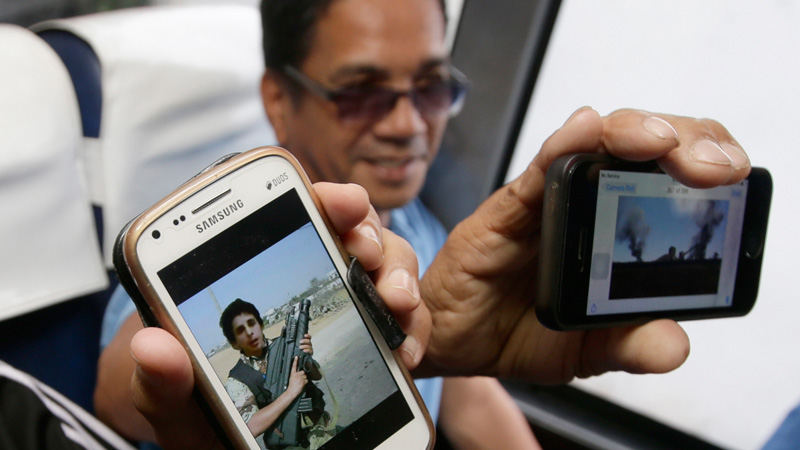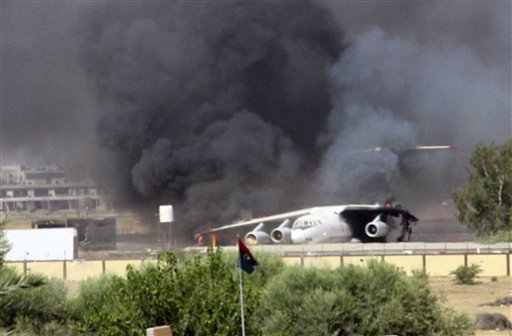OFWs: Jobs in Libya better than coming home

Overseas Filipino workers (OFWs) Wency Ledesma and another worker show the photos taken with their cellphones, of an armed Libyan rebel and the war-torn Benghazi in Libya upon arrival at the Ninoy Aquino International Airport after being repatriated Monday, Aug. 4, 2014, in Pasay City. OFWs in Libya prefer to stay in the strife-torn North African country because they have “better chances of surviving” there than in the Philippines, the Department of Foreign Affairs said on Monday. AP PHOTO/BULLIT MARQUEZ
MANILA, Philippines–Overseas Filipino workers (OFWs) in Libya prefer to stay in the strife-torn North African country because they have “better chances of surviving” there than in the Philippines, the Department of Foreign Affairs (DFA) said on Monday.
Only 1,700 Filipinos working in Libya have signed up for repatriation since the Philippine government ordered a mandatory evacuation of its more than 13,000 workers there last month, said Foreign Secretary Albert del Rosario.
The government has chartered a ship to transport the OFWs this week from Libya to Malta, where flights will be arranged to take them home.
The DFA said it was talking to Philippine Airlines (PAL) for a charter flight to bring the Filipinos home from Malta.
About 160 Filipinos have escaped by land to Tunisia, including 50 workers who were briefly stranded when the border crossing was shut by authorities on Friday night due to violence that erupted amid the rush to escape from Libya, Del Rosario said.
Article continues after this advertisement“I’m not sure that we can get 50 percent to come home,” Del Rosario told The Associated Press after arriving on Sunday in Manila from Tunisia, where he helped arrange the evacuation of Filipino workers in Libya.
Article continues after this advertisementDel Rosario said President Aquino deployed him to Tunisia with an order for him to make sure “no one gets left behind,” but he added that many simply refused to leave despite the danger.
“They’re so scared, but their concerns are their jobs,” he said.
“I was told that if some of them go out of their houses, they get divested of their money and cell phones,” he said. “That is very scary. Nobody seems to be in charge. There are no evident police forces so if you get in trouble, you’re on your own.”
Filipino nurses are especially apprehensive about leaving because employers have enticed them to stay with additional pay and they are committed to their hospital work, Del Rosario said.
Deadly clashes
Since mid-July, Libya has seen deadly clashes between rival militias fighting for control of key population centers, including the eastern city of Benghazi and the capital, Tripoli.

This frame grab shows an airplane on the tarmac of the airport belching black smoke into the air during fighting between the Islamist Misarata brigade and a powerful rival militia, in Tripoli, Libya. AP
The Tripoli airport has been closed since gunmen, mostly Islamist, attacked it in a bid to wrest control from the Zintan brigade of former rebels who have held it for the past three years, after the violent uprising that toppled longtime dictator Moammar Gadhafi.
The latest flare-up of violence, which erupted during the weekend, takes the death toll in Tripoli to 124 since July 13, with more than 500 wounded.
Despite the danger, many Filipinos in Libya have ignored the government’s order for mandatory evacuation, DFA spokesman Charles Jose told reporters on Monday.
“The usual reason we hear from them is that they would rather take the chance. They think they have greater chances of surviving the war [there] than of surviving uncertainty [without jobs] here,” Jose said.
If the government had its way, he said, all OFWs in Libya, including the health workers, would be brought back home.
“But it’s still their decision whether to go home or stay behind,” Jose said.
Warning to leave
As fighting between rival militias escalated, the Philippine government imposed a travel ban on Libya on May 30, warning the Filipinos there to leave.
It then ordered a mandatory evacuation on July 20, after the kidnapping and beheading of a Filipino construction worker in Benghazi.
A Filipino nurse was also abducted and gang-raped in Tripoli last Wednesday, sparking a walkout by her colleagues in Tripoli Medical Center.
The Philippine order for mandatory evacuation has alarmed Libyan health authorities, who have warned of a possible “total collapse” of the country’s healthcare system if all the Filipino doctors and nurses, who make up 60 percent of Libya’s hospital staff, are taken back home.
So far, more than 830 OFWs have returned home. A total of 111 workers are arriving in three groups on commercial flights this week starting Monday night. They are the last group of Filipino evacuees to cross the Tunisia-Libya border as the passage was closed Friday.
The three groups will bring to 942 the number of Filipino workers returning from Libya since the government’s May 30 warning to leave.
Chartered ship
Jose said the Maltese ship chartered by the government was expected to arrive in Libya on Thursday or Friday to pick up Filipino evacuees in Benghazi, Misrata and possibly Tripoli.
The ship will sail back to Malta on Sunday. From there, the evacuees will be flown home on a charter PAL flight, Jose said.
“We are talking to PAL for a charter plane … [PAL is] trying to look for an appropriate plane for the repatriation from Malta to Manila,” he said.
Jose said the cost of the Filipino workers’ repatriation would be paid out of the DFA’s Assistance to Nationals Fund.
He said the government was also coordinating with the International Organization for Migration (IOM), which helped to evacuate Filipino migrant workers from Libya during the uprising against Gadhafi in 2011.
Jose said the plan to evacuate Filipinos in Libya by sea and air was a “one time” thing for now, as the process depended on how many would sign up for repatriation.
‘Proactive step’
Responding to Akbayan Rep. Walden Bello’s criticism last week of the DFA’s lifting of the travel ban on Libya in 2012, Jose said that while the mandate of the department was to look after the Filipino workers’ welfare, it was also “sensitive” to their demands.
When the situation in Libya stabilized after Gadhafi’s fall, he said the Filipino migrant workers who were repatriated during the uprising demanded to be allowed to return.
He said there were 18,000 Filipinos in Libya in early 2011 and 4,500 remained there during the uprising against Gadhafi.
When those who had been repatriated demanded to be allowed to return to their jobs, the DFA eased the travel ban for those with contracts, Jose said.
He said 9,000 returned to their old jobs and over the next three years 4,000 were hired by Libyan employers, bringing the number of Filipino migrant workers in Libya to 13,000.
Jose said Del Rosario traveled to Libya to assess the situation at the start of the unrest in late May. The assessment led to the May 30 warning to leave and to last month’s order for mandatory evacuation.
“We believe the DFA took a proactive step in warning [the Filipino workers there] of imminent threat … and looking after their welfare,” Jose said.–With reports from AP and AFP
RELATED STORIES
21 OFWs from Libya bring tales of terror